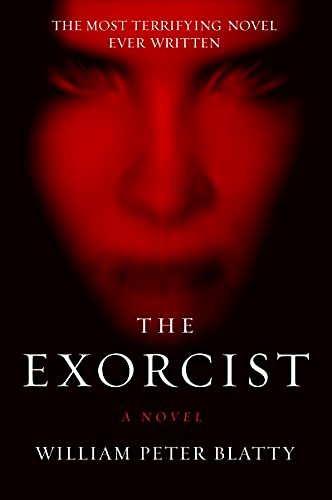Feverish, he rummaged for a holy-water vial.
**********
Willie admitted him to the house. In the entry, he glanced toward Regan's bedroom. Shouts.
Obscenities. And yet not in the deep, coarse voice of the demon. Raspy. Lighter. A broad British... Yes!... The manifestation that had fleetingly appeared when he'd last sees Regan.
Karras glanced down at the waiting Willie. She was staring puzzled at the Roman collar. At the priestly robes. "Where's Mrs. MacNeil, please?" Karras asked her.
Willie motioned upstairs.
'Thank you."
He moved to the staircase. Climbed. Saw Chris in the hall. She was sitting in a chair near Regan's bedroom, head lowered, her arms folded on her chest. As the Jesuit approached her, Chris heard the swishing of his robes. She glanced up and quickly stood. "Hello, Father."
There were bluish sacs beneath her eyes. Karras frowned. "Did you sleep?" "Oh, a little."
He was shaking his head in admonishment.
"Well, I couldn't," she sighed at him, motioning her head at Regan's door. "She's been doing that all night."
"Any vomiting?"
"No." She took hold of his sleeve as if to lead him away. "C'mon, let's go downstairs where we can---"
"No, I'd like to see her," he gently interrupted. He resisted the tugging insistence of her lead.
"Right now?"
Something wrong, reflected Karras. She looked tense. Afraid. "Why not now?" he inquired.
She glanced furtively at the door of Regan's bedroom. From within shrieked the hoarse mad voice: "Damned Naa-zi! Naa-zi cunt!"
Chris looked away; then reluctantly nodded. "Go ahead. Go on in."
"You've got a tape recorder?"
Her eyes searched his with quick movements. Little flicks.
"Could you have it bought up to the room with a blank reel of tape, please?"
She frowned with suspicion. "What for?" Then alarm. "You mean, you want to tape...?" "Yes, it's im---"
"Father, I can't have you...!"
"I need to make comparisons of patterns of speech," he cut in firmly. "Now please! You're just going to have to trust me!"
They turned to the door as an excoriating, stream of obscenities apparently drove Karl out of Regan's bedroom. His face ashen and grim, he was carrying soiled diapers and bedding.
"Get 'em on, Karl?" Chris asked him as the servant closed the bedroom door behind him.
Karl glanced quickly at Karras, then at Chris. "They are on," he said tersely, and went quickly down the hallway toward the staircase.
Chris watched him. She turned back to Karras.
"Okay," she said weakly. "Okay. I'll have it sent up." And abruptly she was walking down the hall.
For a moment Karras watched her. Puzzled. What was wrong? Then he noticed the sudden silence in the bedroom. It was brief. Now the yelping of diabolic laughter. He moved forward.
Felt the water vial in his pocket. He opened the door and stepped into the bedroom.
The stench was more powerful than the evening before. He closed the door. Stared. That horror.
That thing on the bed.
As he approached, it was watching with mocking eyes. Full of cunning. Full of hate. Full of power.
"Hello, Karras."
The priest heard the sound of diarrhetic voiding into plastic pants.
He spoke calmly from the foot of the bed. "Hello, devil. And how are you feeling?"
"At the moment, very happy to see you. Glad." The tongue lolled out of the mouth while the eyes appraised Karras with insolence. "Flying your colors, I see. Very good." Another rumbling. "You don't mind a bit of stink, do you, Karras?"
"Not at all."
"You're a liar!"

























